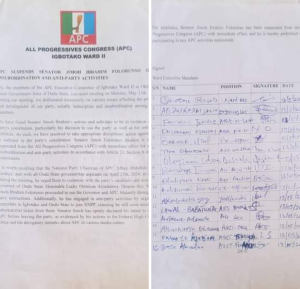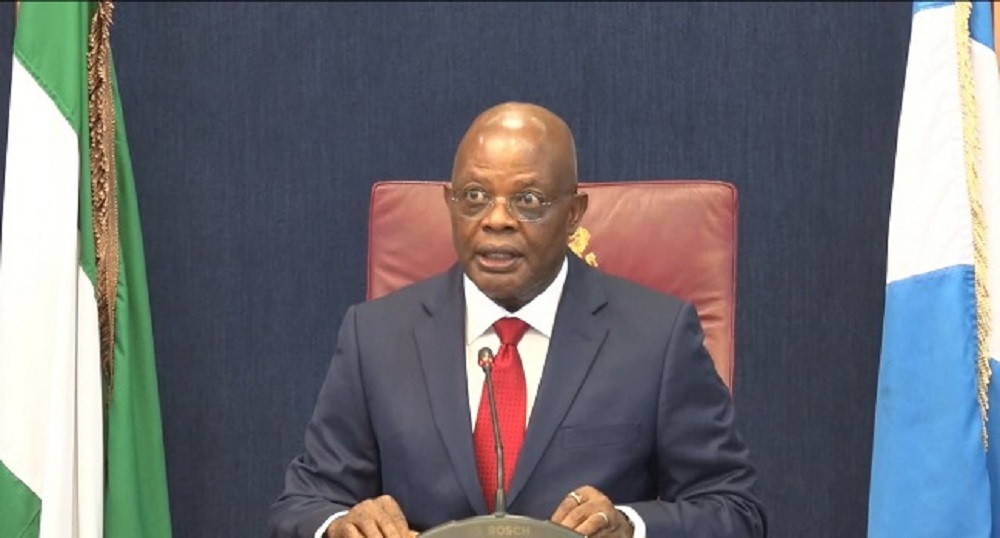News
Just in: APC fires Jimoh Ibrahim

By Kayode Sanni-Arewa

The All Progressives Congress, APC, Ondo State chapter has suspended Senator Jimoh Ibrahim representing Ondo South Senatorial District in the National Assembly
He was suspended for alleged anti-party activities.
The lawmaker was suspended by members of the APC Executive Committee of Igbotako Ward 11 in Okitipupa Local Goverment Area of Ondo State.
The notice was signed by ward executive members including Bakere Usuf, Tore Obwoselu, Oloyinmi Idowu, Borewaye Louyomi, Oladipupo Bose, Alkimbobola Seyi, Lawal-Babatunde, Aritawe-Ademole, Akinkuoju Olarewaju and Fabioye Ajoke.
Ibrahim’s suspension is coming after he lost out in the party’s governorship primary election in the state.
Details to follow…
News
Suit Seeking To Sack Ibas As Administrator Suffers Heavy Setback

A lawsuit aiming to remove Vice Admiral Ibok-Ete Ibas (rtd) as the Sole Administrator of Rivers State faced a setback on Thursday when the court proceedings were delayed.
The case, filed by lawyer Johnmary Jideobi, was postponed after the plaintiff’s representative, Chimezie Enuka, informed the court that some defendants had not been served with the necessary legal notice.
These defendants included officials from Zamfara and Bauchi states, who had not received their hearing notices in time.
During the hearing, the only attorneys present were those representing Lagos, Bayelsa, Taraba, and Edo states, as the other 32 state attorneys general listed as defendants were absent.
Enuka assured the court that all defendants would be served by April 13, leading to the court’s decision to adjourn the case until June 11.
In the lawsuit, which is registered under the case number FHC/ABJ/CS/572/2025, Jideobi has named President Bola Tinubu as the first defendant, followed by Vice Admiral Ibas and the attorneys general from the 36 states of Nigeria.
News
Islamic Cleric Wants Death Penalty For Whoever Changes Religion

Dr. Ibrahim Jalingo, an Islamic scholar and the National Chairman of the Council of Ulama, has sparked intense public debate following a controversial statement supporting the death penalty for individuals who renounce Islam.
The cleric made his remarks in a post shared on Thursday via his official Facebook page, where he defended a Hadith that prescribes capital punishment for apostates.
Writing in the Hausa language, Jalingo offered a firm rebuttal to critics who challenge the authenticity of certain Hadiths, particularly one that states: “Whoever changes his religion, kill him.” He described such critics as victims of “compound ignorance” and accused them of intentionally misrepresenting Islamic teachings to create confusion among Muslims.
His response was directed at those questioning the consistency of the Hadith tradition with the Qur’an. One such critic, identified as Issiyaku Abdulkadir, had apparently presented a list of 100 Hadiths he claims contradict the Qur’an. Jalingo used this as an opportunity to launch a detailed theological counterargument.
“Today, I came across the first among what these fabricators call the ‘100 Hadiths that contradict the Qur’an.’ They claim believers in divine revelation cannot respond to these contradictions. The Hadith they referenced is: ‘Whoever changes his religion, kill him,’” Jalingo stated in his post.
He went on to issue a strong critique of his opponents, accusing them of misguiding the public. “Let it be known that Hadiths are not merely interpretative texts. They, like the Qur’an, are divinely inspired. The Prophet Muhammad (peace be upon him) said: ‘Indeed, I was given the Qur’an and something like it along with it.’ This affirms the divine origin of Hadith literature,” Jalingo argued.
To reinforce his position, the cleric cited several Qur’anic verses which, in his view, support the Hadith’s stance on apostasy. Among them was Surah At-Tawbah (9:5), which mentions combat against polytheists, and verses from Surah Al-Baqarah and Surah An-Nisa’ that refer to fighting non-believers in specific historical contexts.
He also addressed the popular Qur’anic verse “There is no compulsion in religion” (Surah Al-Baqarah 2:256), arguing that it has been abrogated by later revelations and should not be interpreted as a blanket guarantee of religious freedom. “Claims that this Hadith contradicts the Qur’an show a fundamental misunderstanding of Islamic jurisprudence and the concept of ‘naskh’ (abrogation), which is well-established in Islamic theology,” Jalingo said.
Jalingo’s tone grew increasingly combative as he criticized those spreading opposing views, using harsh language to discredit them. He likened their rhetoric to that of “prostitutes and effeminate men,” a choice of words that has drawn strong backlash online.
The cleric’s remarks have since gone viral, drawing a mix of reactions across social media. While some have applauded his defense of traditional Islamic scholarship, others have condemned his advocacy of capital punishment and his disparaging treatment of dissenting voices.
Broader Implications and Reactions
This incident has reignited ongoing debates within Muslim communities about the role of Hadith in modern jurisprudence, the limits of religious freedom, and the ethical boundaries of public discourse among religious leaders. While conservative scholars argue that Hadiths are essential to understanding and applying Islamic law, reformist voices stress the need for contextual interpretation, especially on sensitive issues like apostasy.
READ ALSO: No Approval For 3-storey Buildings Without Elevator – Abia Govt Warns Developers
Human rights advocates have also weighed in, warning that such endorsements of capital punishment for apostasy could fuel religious intolerance and justify violence under the guise of doctrinal purity.
The controversy underscores the tensions between traditional interpretations of Islamic law and contemporary human rights frameworks, a debate that continues to shape religious discourse across the Muslim world.
News
Security operatives halt attempt to break into VP Shettima’s residence, nab suspect

Security guards have arrested a 35-year-old man, Musa Ibrahim, of Maduganari area, Maiduguri, Borno State, for attempting to gain unlawful access into the private residence of Nigeria’s Vice President, Senator Kashim Shettima.
A report by counter-insurgency expert Zagazola Makama quoted intelligence sources as disclosing that the incident occurred on April 9 at about 0530hrs at the residence located in New GRA, Gwange 3 Ward off Bama Road, Maiduguri, the capital of the restive Borno State.
According to zagazola in a story published Thursday, April 10, “The sources said that the suspect reportedly attempted to scale the perimeter wall through the Gadabul River bank behind the western side of the residence.
“On sighting the security personnel, the suspect tried to escape but was shot in the leg and subsequently arrested.
“He was immediately taken to the University of Maiduguri Teaching Hospital (UMTH), where he is currently receiving treatment and responding.
“The case has been transferred to the State Criminal Investigation Department (SCID) for discreet investigation.
“Meanwhile, security deployment at the residence of the Vice President has been reviewed and strengthened.”
-

 News5 hours ago
News5 hours agoAmbassadorial list ready for NASS review after DSS clearance – FG
-

 News21 hours ago
News21 hours agoAgain, FCT minister emerges winner of quinquennial Leadership award
-

 News16 hours ago
News16 hours agoAkpabio wants Senator Natasha jailed over inflammatory comments
-

 News13 hours ago
News13 hours agoMichelle Obama Speaks In Alleged Failed Marriage with Her Husband Barack Obama
-

 News24 hours ago
News24 hours agoSEE Current Black Market Dollar (USD) To Naira (NGN) Exchange Rate
-

 News16 hours ago
News16 hours agoSenior lawyer caution against misinterpretation of Supreme Court Judgement
-

 Education20 hours ago
Education20 hours agoJAMB deploys decoy website to tackle examination malpractices
-

 News20 hours ago
News20 hours agoLeadership Quinquennial Award: TeeJay Yusuf hails FCT Minister, Wike, says “he’s truly a trail blazer”





